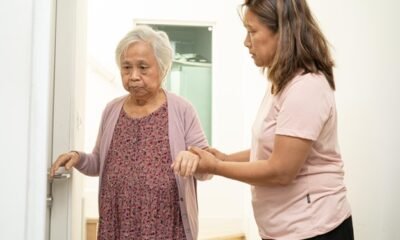Health
Building Resilience in Senior Living: Mental Health Strategies

Image by Freepik
As people get older, they go through many changes in their lives. These changes can be physical, emotional, or social, and they often affect mental health. In senior living communities, older adults may feel lonely, miss loved ones who have passed, or find it hard to adjust to a new environment.
These challenges can be tough, but there is a way to help by building resilience. Resilience means being able to bounce back after hard times. It’s about staying strong, hopeful, and able to keep moving forward.
The good news is that resilience is not something you are just born with. It can be built and improved at any age. Here are some simple mental health strategies to help older adults build resilience:
Build Social Connections
Loneliness is one of the biggest problems for many seniors. Being around others and making friends can greatly improve mood and mental health.
Senior living communities can help by offering group activities like games, music nights, and group meals. Having someone to talk to or share time with makes a big difference.
Find a Sense of Purpose
Everyone wants to feel needed and useful. Seniors can feel more positive when they have a reason to get up in the morning.
This could be helping others in the community, mentoring younger people, or doing creative activities like painting or gardening. Feeling needed helps people stay strong emotionally.
Stay Physically Active
Exercise doesn’t have to be hard or tiring to be helpful. Simple activities like walking, stretching, or chair yoga can boost mood and reduce stress.
Exercise also helps improve sleep and keeps the brain sharp. Moving the body helps the mind feel better, too.
Learn Ways to Relax and Stay Calm
Stress affects everyone, including seniors. Teaching easy ways to relax, like deep breathing, meditation, or listening to calming music, can help. Mindfulness classes or quiet spaces in the community can also support emotional health.
Create a Positive Environment
A cheerful and safe environment helps people feel at ease. Bright lighting, comfortable furniture, and nature-friendly spaces like gardens or patios can lift spirits. Friendly staff and welcoming community spaces also make seniors feel cared for and supported.
Offer Mental Health Support
It’s important for seniors to have access to counselors or therapists when they need to talk. Regular mental health checkups can help spot problems early.
Many communities now also offer telehealth services, so seniors can talk to professionals without leaving their rooms. With the right support, this can greatly help in reducing stigma in senior communities.
Support Independence
People feel stronger when they can make their own choices. Letting seniors decide things like what to eat or what activity to join gives them a sense of control. Feeling in charge of their life helps boost confidence and mental strength.
Maintain Your Mental Health as You Age
Resilience helps older adults face challenges with strength and hope. By creating caring and supportive senior living communities, we can help residents stay mentally strong and emotionally healthy.
With good social connections, a sense of purpose, physical activity, relaxation techniques, a positive environment, mental health support, and independence, seniors can live happier, more fulfilling lives. Helping them build resilience is one of the best ways to support their well-being every day.
If you want to read more articles, visit our blog.
-

 Quotes3 years ago
Quotes3 years ago53 Motivational Gym Quotes to Fuel Your Workout
-

 Motivation5 years ago
Motivation5 years ago4 Fun New Hobbies To Try This Year
-

 Quotes10 years ago
Quotes10 years ago50 Most Powerful Quotes Ever Spoken
-

 Quotes2 months ago
Quotes2 months ago100 Motivational Quotes to Inspire You in 2026
-

 Quotes2 years ago
Quotes2 years ago43 Inspirational Quotes About Thoughts
-

 Quotes3 years ago
Quotes3 years ago105 Motivational Quotes by Famous People
-

 Quotes7 months ago
Quotes7 months ago100 Motivational Quotes to Start Your Day with Positivity
-

 Education1 year ago
Education1 year agoHow to Motivate Yourself to Study: 6 Proven Techniques






























